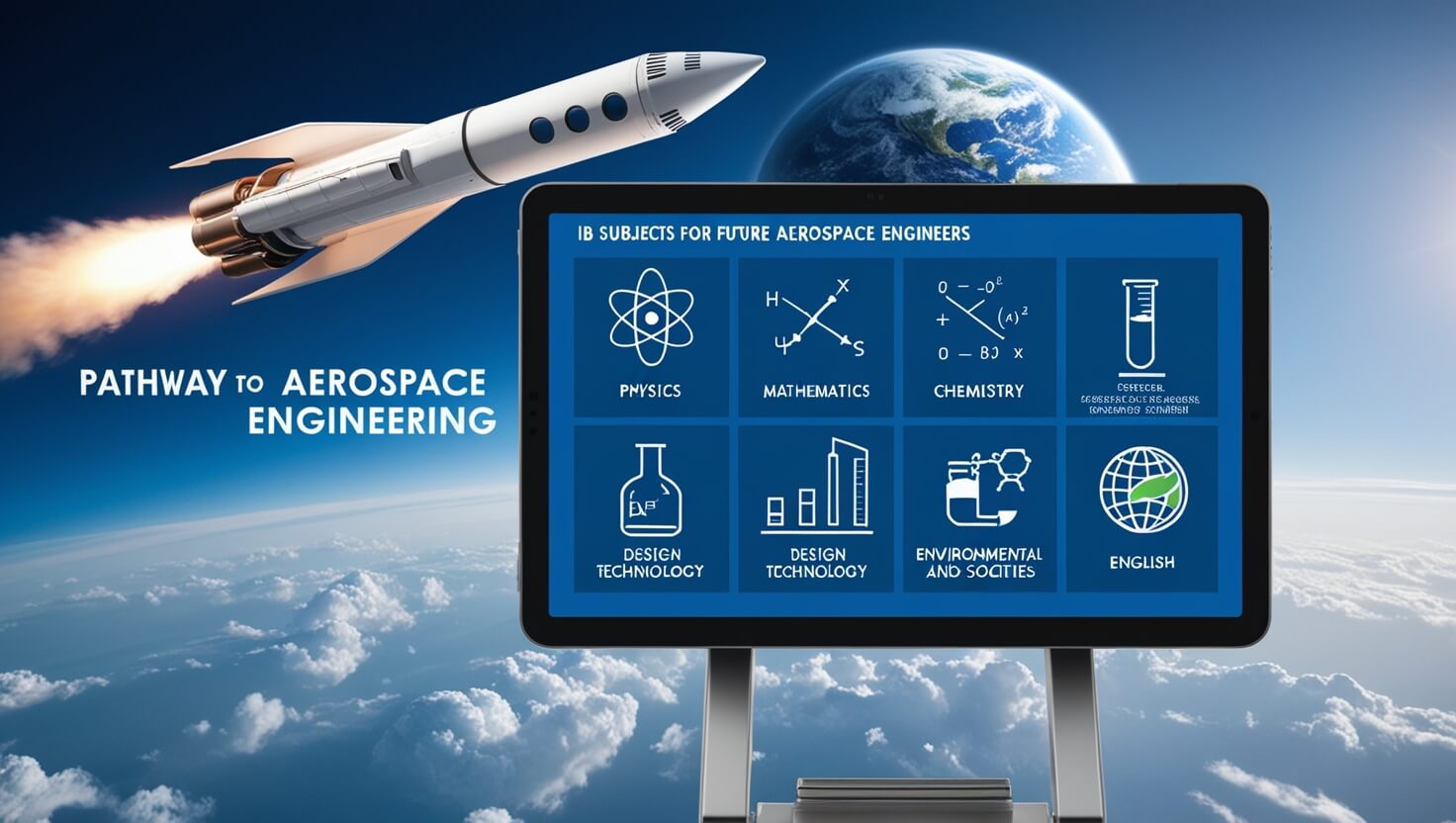IB Subjects for Aerospace Engineering: A Pathway to the Skies

IB Subjects for Aerospace Engineering: A Pathway to the Skies
Making the right choices in IB Diploma Programme subjects requires much planning from students, especially when students opt to pursue Aerospace Engineering as their career path. Aerospace engineering is an interdisciplinary field that involves aircraft and spacecraft design, development, and testing, which requires a good grounding in science, mathematics, and problem-solving skills. The flexibility of the IB curriculum opens up opportunities for students to make choices that align with their career goals; however, they must make smart choices and build a profile in order to gain admission to competitive universities. This blog will take through the best IB subject combination that will prepare a student for a degree in aerospace engineering.
Group 1: Language and Literature
While it can be strictly technical, sound communication skills are absolutely essential for aerospace engineers. Reports have to be written and ideas communicated clearly, and teams need to work with people from all walks of life. For those reasons alone, it pays to take English Language and Literature at HL or SL to hone skills in communication, analysis, and critical thinking. This can also include the study of Language B, a second language, during at least one level of MYP- if you're working in multinational teams or with international organizations in the future.
Group 2: Language Acquisition
Language Acquisition, such as in Spanish, French, or Mandarin, is not as directly related to aerospace engineering, but potentially speaking another language can be an advantage, since the aerospace industry has an international scope. Boeing, Airbus, or NASA operate around the world, therefore communication with partners on other continents may make a difference. Thirdly, this ability to apply a second language represents cognitive flexibility which can pay off indirectly in the form of problem-solving abilities and analytical skills. Deciding on taking a second language can be based on pure interest or the desire to pursue a career that involves international aerospace collaborations.
Group 3: People and their environments
Aerospace engineering programs have a technical character; however, it is beneficial to be aware of all the societal economic determinants of that industry. Group 3 can be subjects like Economics or Geography, which are not taken as a requirement but should give a student an appreciation of the global industry context. Much can also be learned for being a well-rounded engineer when one learns about the environmental and economic implications regarding such projects as aerospace, for example, the environmental impact of air travel or the economics behind space exploration. Because of the priority given to STEM subjects, Group 3 courses take a backseat. Many students prefer to take these at Standard Level.
Group 4: Sciences
In addition, students planning to take a course in aerospace engineering need Group 4 subjects. HL Physics is essentially mandatory. In fact, without a proper understanding of the physics that addresses aerodynamics and propulsion, as well as thermodynamics, much of the physical underpinning of aerospace engineering simply cannot be grasped. Universities virtually always require or strongly recommend HL Physics for entry-level programs in aerospace engineering because it lays the basic groundwork for understanding the mechanics of flight and the laws of physics governing travel in space.
Chemistry is not as basic as physics, but it becomes important when a student has relevant interest in fields such as materials science, propulsion systems, or combustion. Most aerospace engineering programs have tracks in these areas. Chemistry is typically taken at the SL; however, if students have relevant interest in chemical processes as applied in aerospace, they might take this at the HL level.
Computer science is another Group 4 subject that can also complement aerospace engineering aspirations. The more AI systems, avionics systems, and simulation software push to the forefront of the aerospace engineering industries, the more important a background in computer programming may be. Although certainly not usually required, some knowledge in computer science does make the student more presentable at an interview.
Group 5: Mathematics
Math is the rocket fuel for aerospace engineering. Just like a rocket needs strong engines, aerospace engineers need a solid foundation in math.
The IB offers two math courses: Analysis and Approaches (AA) and Applications and Interpretation (AI). For aerospace engineering, AA at the Higher Level is the best choice. This course is all about theoretical and abstract math, giving you the strong base you need for calculus, differential equations, and linear algebra—the building blocks of engineering.
Some universities might accept AA at the Standard Level, but for top programs, Higher Level is usually recommended. So, if you want to soar high in aerospace engineering, make sure your math skills are out of this world!
Group 6: The Arts (or another subject)
Group 6 is usually for the arts, but aerospace engineers often choose a different path. Most students studying aerospace engineering opt for another science or computer science subject instead of the arts. For example, taking both Physics and Chemistry at the Higher Level, or adding Computer Science as an elective, can give you a stronger technical background. This flexibility lets you dive deeper into the sciences, making sure you're ready for the technical challenges of aerospace engineering programmes.
The Extended Essay (EE) and Theory of Knowledge (TOK)
The Extended Essay (EE) allows students the opportunity to go deeply into their chosen topic, and an aspiring aerospace engineer could get inspiration for his or her research in a topic related to aerospace technology, physics, or material science. An effectively researched EE in a technical area not only reflects the interest of a student in that field but also builds necessary skills in research, critical for university-level engineering projects.
TOK, although not directly involved with aerospace engineering, provides something that makes students of all disciplines think critically about knowledge and its application. Ethics and philosophical questions regarding the effects of space exploration on the environment and technological innovations possessed by modern aerospace engineering make the TOK a valuable part of the IB programme.
The IB Diploma Programme, therefore, offers a flexible and rigorous course that leads to higher education for students interested in pursuing aerospace engineering; it affords students a thorough academic background through a strong combination of such subjects as Higher Level Physics, Mathematics, and other relevant sciences. The IB's focus on interdisciplinary thinking, critical analysis, and global awareness also ensures that the students, who are technically equipped, are also prepared to think creatively and collaboratively in the ever-changing field.




